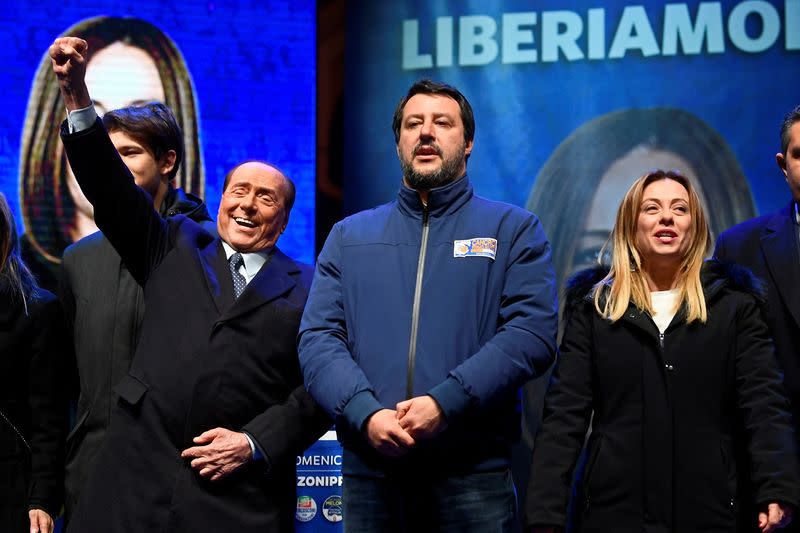Analysis-Italy's giveaway election pledges risk market backlash
By Gavin Jones
ROME (Reuters) - Italy's public debt is the second highest in the euro zone at around one and a half times the size of its economy, but you would never guess it from reading the pledges of the main parties ahead of next month's national election.
The manifestos of the front-running rightist alliance, the centre-left Democratic Party (PD) and the unaligned 5-Star Movement have one thing in common.
All three make extremely costly promises with virtually no indication of how to finance them - and financial markets are already on alert, potentially ushering in a more expensive phase for Italian bonds.
The pledges include sweeping tax cuts, higher state salaries and pensions, earlier retirement, a social housing drive, subsidies on electricity bills, and even a "dowry" of up to 10,000 euros ($9,950) for teenagers when they turn 18.
"The parties have decided the quickest way to garner support is to promise everything to everyone," said Roberto Perotti, economics professor at Milan's Bocconi University.
Before the last election in 2018, politicians made similarly generous promises, but also undertook to slash a public debt considered unsustainable at 132% of gross domestic product.
That debt figure now stands almost 20 percentage points higher but, with European Union budget rules temporarily suspended due to COVID-19, none of the main parties have set targets for reining it in.
"Across the Italian political class debt has simply been taken out of the discussion," said Tim Gwynn Jones, euro zone analyst at Medley Advisors, a financial market consultancy firm.
Even without the EU's Stability Pact, markets will deliver "a rude awakening" after the Sept. 25 ballot if the winners try to push through their plans, he said.
Italy's borrowing costs are already climbing steeply, driven by soaring inflation, rising interest rates and political uncertainty.
Investor bets against its government bond market are at their highest since 2008, data from S&P Global Market Intelligence suggest, signalling growing unease about the outlook.
'HOLIDAY FROM REALITY'
Lower taxes "for families, firms and the self-employed" is the overarching pledge of the programme of the conservative bloc made up of Giorgia Meloni's Brothers of Italy, Matteo Salvini's League and Silvio Berlusconi's Forza Italia.
Details include a single tax rate on annual income up to 100,000 euros for the self-employed, and cuts to value added tax on energy and other essentials.
On the spending side, the alliance promises to hire more health workers, raise investments in research to the EU average, make early retirement easier and increase minimum pensions.
At around 16% of GDP, Italy's public pensions bill is already the second highest in the 27-nation bloc, figures from statistics agency Eurostat show.
None of the promises are costed and the manifesto makes no reference to the impact on tax revenues, debt or the budget deficit, which was 7.2% of GDP at the end of 2021.
Gwynn Jones said the parties had enjoyed a "holiday from reality" during the 18-month unity government of outgoing Prime Minister Mario Draghi, knowing Italy was partly shielded by the ex-European Central Bank chief's credibility with markets and asset purchasing programmes that the ECB is now winding down.
"There is an assumption among Italian politicians that the ECB will always be there (to buy its bonds)," Gwynn Jones said. "This is exactly the sort of moral hazard some ECB hawks have warned against."
DEBT CRISIS?
Bocconi University's Perotti calculated that more than 70 of the conservative parties' individual and combined promises would reduce revenues and more than 50 would increase spending, costing well over 100 billion euros in all.
"Even if they only push through the ones on taxes and pensions there will be a debt crisis," he said.
Brothers of Italy leader Meloni, widely expected to become the country's first woman prime minister, told Reuters on Thursday she would be cautious and "responsible" with public accounts, without going into detail.
The centre-left Democratic Party's 37-page manifesto looks no less costly than the right's.
It includes the teenagers' "dowry", and an increase in net salaries by the equivalent of one month per year thanks to the state paying welfare contributions currently charged to workers.
It also promises higher pay for teachers and health workers, tax cuts for medium and low earners and the scrapping of a regional business tax - pledges echoed by 5-Star - plus free electricity for the poor and 500,000 new homes under a social housing programme.
Like the right, the Democratic Party makes no significant reference to public finances other than saying the EU must "definitively leave behind the era of austerity."
Francesco Saraceno, economics professor at Rome's Luiss University and Sciences Po in Paris, described the parties' programmes as "fairy tales" that would be largely shelved soon after the election.
So he sees little risk of a market meltdown if, as expected, the rightist bloc comes to power.
"I think there will be a brief negative reaction... but then it will become clear the new government will do very little to change public finances and the markets will calm down," he said.
($1 = 1.0051 euros)
(Editing by John Stonestreet)

 Yahoo Finance
Yahoo Finance 

